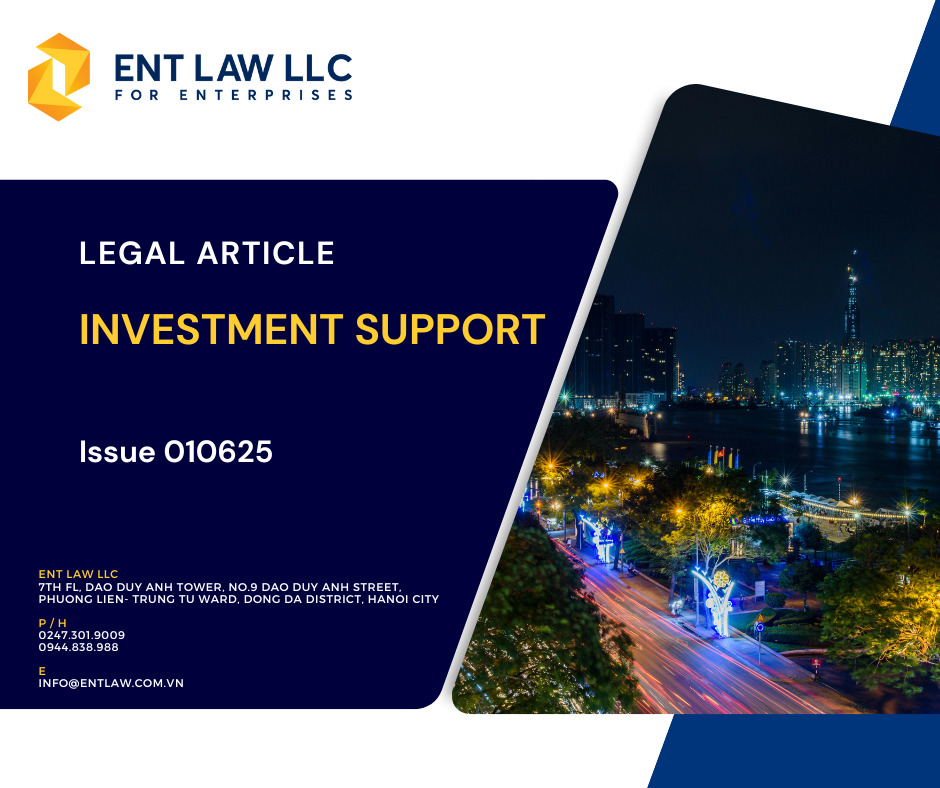Dear Valued Clients,
In addition to incentives policies such as tax exemptions/reductions and land rent exemptions, Vietnam also implements a range of practical investment support measures for projects that significantly contribute to socio-economic development. To help investors effectively leverage the advantages provided by the current legal framework, we are pleased to share the following article – an overview of investment support policies in Vietnam under current regulations.
1. Form of investment support
Investment support refers to a set of measures, policies, and tools applied by the State to create more favorable conditions for investors during project implementation. Unlike investment incentives, investment support does not necessarily involve exemptions or reductions of financial obligations. Instead, it may include technical assistance, infrastructure support, land access facilitation, workforce training, administrative procedure assistance, and more.
According to Clause 1, Article 18 of the Law on Investment 2020, the forms of investment support in Vietnam include:
- Support for the development of technical and social infrastructure systems within and beyond the project’s boundaries;- Support for training and human resource development;
- Credit support;
- Support in accessing production and business premises; support for relocation of production and business facilities as mandated by competent state authorities;
- Support for science, technology, and technology transfer;
- Support for market development and information provision;
- Support for research and development (R&D).
2. Beneficiaries and procedures for receiving investment support
a) Beneficiaries
According to Article 18.2 of the Law on Investment 2020, currently, only enterprises operating in certain sectors that have a significant impact on socio-economic development are eligible for investment support. These sectors include:
- High-tech enterprises, science and technology enterprises, and science and technology organizations:
Specific policies are stipulated in Decree No. 76/2018/ND-CP and Decree No. 13/2019/ND-CP. Notable support measures include: Interest rate subsidies of up to 50% or loan guarantees provided by ministerial-level Science and Technology Development Funds or the National Technology Innovation Fund) [1] ; permission to use the Science and Technology Development Fund to commercialize research outcomes [2]; support for hiring consultants to assist with equipment calibration, technological process refinement, and production line evaluation; funding from the state budget for training and professional development activities [3].
At the same time, Decree No. 182/2024/ND-CP provides detailed regulations allowing high-tech enterprises or enterprises with investment, production, or high-tech application projects to submit applications for support from the Investment Support Fund. The eligible support levels include: up to 50% of human resource training costs; up to 30% of R&D expenses; up to 30% of R&D expenses; up to 3% of the value of high-tech product output; up to 50% of initial investment costs; up to 25% of social infrastructure development costs [4].
- Enterprises investing in agriculture and rural development: Specific policies are provided under Decree No. 57/2018/ND-CP. Key support measures include: support for infrastructure development in raw material zones (VND 50 million/ha, up to VND 10 billion per project); support for labor training (VND 2 million/person/month); support for labor training (VND 2 million/person/month); support for research and technology transfer (up to VND 300 million per research topic, or VND 1 billion per pilot project).
- Enterprises investing in education and legal dissemination: Eligible for investment credit loans or post-investment support [5], and financial assistance for infrastructure development [6].
b) Procedures for Receiving Investment Support
Each investment support application may follow a different process depending on the type of support and the governing authority; however, the general procedure is as follows [7]:
- First, the enterprise must demonstrate its eligibility for support through relevant legal and technical documentation. This may include certificates such as a Science and Technology Enterprise Certificate, Technology Transfer Registration Certificate, or Certificate of High-tech Agricultural Enterprise, accompanied by supporting documents such as technology transfer contracts, explanatory statements of high-tech products, and actual expenses incurred for eligible support activities.
- Second, the enterprise must submit its application to the competent state authority. For example, enterprises investing in high technology should submit to the Department of Science and Technology or the Investment Support Fund. Meanwhile, agricultural enterprises should submit to the Department of Agriculture and Rural Development or other authorized state agencies as prescribed by law.
- Third, once the application is approved, the competent authority will disburse the investment support funds to the enterprise.
As usual, we hope you find this Legal Article helpful and look forward to working with you in the upcoming time.
Kind regards,
ENT Law LLC
[1] Article 14, Decree No. 13/2019/ND-CP
[2] Article 16.3, Decree No. 13/2019/ND-CP
[3] Articles 8.3 and 8.4, Decree No. 76/2018/ND-CP
[4] Articles 19, 20, 21, 22, and 23, Decree No. 182/2024/ND-CP
[5] Article 9, Decree No. 69/2008/ND-CP
[6] Article 18.5, Decree No. 69/2008/ND-CP
[7] Reference: Chapter IV, Decree No. 182/2024/ND-CP

 Tiếng Việt
Tiếng Việt


Issue of February 2026 – Decision No. 92/QD-BTC on enterprise registration and establishment procedures
Dear Valued Clients, The Ministry of Finance (MoF) issued Decision No. 92/QD-BTC (“Decision 92”) on January 19, 2026,...
Feb
Issue of January 2026 – Decree No. 20/2026/ND-CP Guiding Resolution No. 198/2025/QH15 on the Development of the Private Economy
Dear Valued Clients, Decree No. 20/2026/ND-CP (“Decree 20”) was promulgated by the Government on January 15, 2026, providing...
Jan
RECRUITMENT ANNOUNCEMENT
Position Lawyer / Trainee Lawyer(Priority given to candidates who are currently enrolled in or have completed the Lawyer...
Jan
Issue of December 2025 – Amended Personal Income Tax Law
Dear Valued Clients, The National Assembly of Vietnam officially adopted the Fourth Draft of the Law on Personal...
Dec